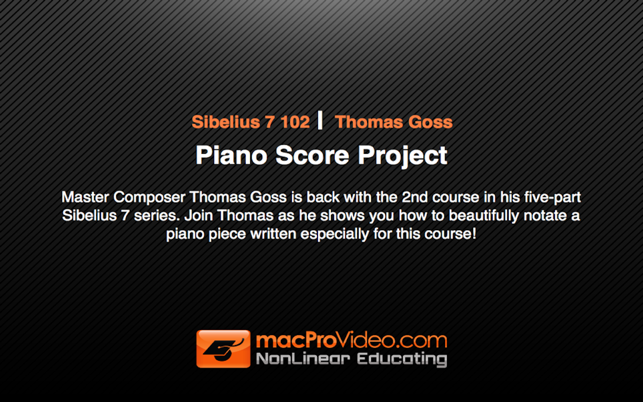價格:免費
檔案大小:526.5 MB
版本需求:OS X 10.7 或以上版本,64 位元處理器
支援語言:英語

Master Composer Thomas Goss is back with the 2nd course in his five-part Sibelius 7 series. Join Thomas as he shows you how to beautifully notate a piano piece written especially for this course!
When in the hands of a expert user like Thomas Goss, Sibelius 7 can do just about anything when it comes to putting notes on the page. In this 25-tutorial course, Thomas makes the notes dance on the grand staff as he enters them con moto, using the various input methods you learned in his previous course—including the extra useful "sticky tuplets" feature. His beautiful Sonatina is the perfect vehicle to show you how to enter intervals and chords, pedal markings, dynamics, and much more. Thomas also shows you how Sibelius' playback system can help you when proofreading your work while you're crafting it. After all the music has been entered on the grand staff, Master Goss makes sure the music looks its absolute best by showing you all the formatting tricks you need.
When you reach the last measure of this amazing notational journey, you'll have beautifully crafted pages of original piano music, ready to print and perform!
Stay tuned for the next course in this series, where Thomas switches gears and tackles a Jazz Quintet project!
Table of contents:
1. Download and Preview Sample Score
2. Creating a Piano Score
3. Intervals and Two-voice Input
4. Duplicating and Spot-Editing

5. Grace Notes, Slurs, and Articulations
6. Triplets - Part 1
7. Triplets - Part 2
8. Re-Inputting Pitches
9. Navigating Sibelius
10. Transpositions
11. Expression Text and Hairpins
12. Trills, Ottava, and Pedal Marks
13. Barlines, Repeats, and Audio-proofing

14. Enharmonic Notes and Chords
15. More Two-voice Input and Re-inputting Pitches
16. Cross-Staff Notes and Retrograde Motion
17. Key & Time Signatures plus Tempo Changes
18. Restoring Key, Time Signature, and Tempo
19. Voice-editing and More Transpositions
20. The Notation Workflow at Top Speed
21. Ossia Staff
22. Fingerings

23. Document Setup and Layout
24. Title Page, Headers, and Dedication Text
25. Two-Sided Printing, and What’s Ahead

